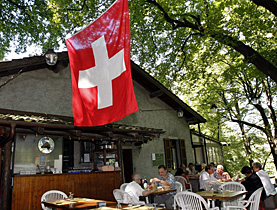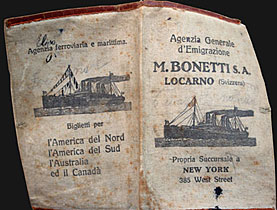Italian Swiss… or Swiss Italians?

Could it be that Switzerland's only exclusively Italian-speaking canton is having an identity crisis? swissinfo put the question to expert, Antonio Gili.
Gili, director of the Historical Archive in Lugano, argues that the Ticenesi can be both Swiss and Italian at the same time.
The dual nature of canton Ticino is a matter of history. Having belonged to the Duchy of Milan, it was ceded to the Swiss confederates at the beginning of the 16th century – as if a child of Italian parentage had been raised in a Swiss family.
swissinfo: When a foreigner asks you if you feel more Swiss or more Italian, what do you say?
Antonio Gili: Stated in those terms the question is a fair one, because it is more nuanced than if you had simply asked “Do you feel you are Swiss or Italian?”.
The comparative “more” suggests that the two terms, Swiss and Italian, are not mutually exclusive but can overlap. And that is right, because in terms of identity I am ticinese, i.e. Italian-Swiss. Where culture is concerned, the great Ticino statesman of the 19th century, Stefano Franscini, put it the other way round, defining himself as a “Swiss Italian”, a formula that no 20th-century Ticino politician or intellectual would have used because of its obvious associations with irredentism [the idea that Italian-speaking parts of countries bordering Italy were under foreign domination and should be “redeemed”, i.e. restored to the motherland] and the nationalism of Fascist Italy.
Therefore, in some ways I feel more Italian and in others more Swiss. For historical reasons and owing to the very nature of the Swiss “state”, a Swiss citizen is not just Swiss – we all know there is no such thing as a Swiss language – but, depending on his language background, he is German-speaking Swiss, French-speaking Swiss, Italian-speaking Swiss or Romansh-speaking Swiss, though it should be noted that German speakers are in the majority.
The German spoken in Switzerland is of ancient origin and differs from the German (High German) spoken in Germany. On the other hand, the French and Italian spoken in Switzerland are the same as the languages spoken in France and Italy, albeit with some regional variants. Italian is spoken only in Ticino and in some parts of Canton Graubünden, though there are also communities of Italian immigrants living in the main towns and cities of German and French-speaking Switzerland.
Finally, Romansh is a language unique to Switzerland, and is spoken only in some regions of Graubünden.
The reason for this multilingual, multicultural situation is that Switzerland is not one nation but a collection of many nations, a “country” born (in 1291) of the alliance of a small number of cantons, which have been joined by others over the centuries and now form a Federal State or Confederation.
The Ticinesi therefore feel Swiss mainly as a result of belonging to a state in which, thanks to the federal system, they have full political and institutional autonomy, albeit within the limits set by the federal constitution, to which all the cantons are subject.
On the other hand, they feel more Italian on account of the language and culture they share with neighbouring Italy. Over the centuries, this common culture has fostered trade and created a bond between the Ticinesi and the humanistic culture of Italy, particularly Lombardy, in the realms of literature, art, religion, music and so on.
swissinfo: From a cultural point of view, do the Ticinesi today tend to look north or south?
A.G.: I think the Ticinesi now look both north and south, though for linguistic and cultural reasons the influence of neighbouring Italy, especially Lombardy, is the greater.
swissinfo: How would you describe relations between Ticino and Italy politically and economically?
A.G.: Political and economic relations between Switzerland and Italy have always been rigidly fixed at the national level between Bern and Rome, with all the attendant limitations, given the Italian bureaucracy’s poor understanding of Switzerland and its federal political culture. In addition, the centralised nature of Italian government is unhelpful when it comes to solving the structural problems (communications, transport, etc.) of the parts of Lombardy bordering Ticino.
However, in recent decades we have seen a more dynamic relationship between the political and business leadership of the two countries, thanks in part to a change in mentality in northern Italy. Relations are no longer dominated by the Bern-Rome axis; there is also room for freer initiatives on the part of individual cantons, including Ticino (with Lugano leading the way in the business sphere). Because of their knowledge of Italian affairs, and familiarity with Lombardy and Piedmont, the Ticinesi have played a key role in these developments.
swissinfo: Ticinesi do not like being referred to as “Italians” by the Swiss, but when in Italy they do not care to be lumped together with other Swiss… Does this mean they are a people without a clear identity?
A.G: That is true. The Ticinesi do not like being regarded as Italians. First of all because Italian political culture is vastly different from that of Switzerland. Think for a moment of the Kingdom of Italy (a monarchy established in 1861 when the peninsula was welded into a single state). As a political system, this was totally alien to the unique form of democracy developed by the Swiss cantons. The same was true of the Fascist regime.
Then ticinesi differ from Italians in their typically Swiss propensity for moderation in relations between political parties, and for pragmatic, non-ideological solutions.
As the ticinesi see it, Switzerland is a country in which they form a political minority and are subject to paternalism and potential discrimination on the part of the German-Swiss majority. Switzerland also represents a sometimes rather narrow and boring way of life, which contrasts with their own Latin and Italianate character. These are some of the reasons why ticinesi do not like being regarded as Swiss.
Nevertheless, for the reasons mentioned earlier, the people of Ticino do have a clear identity. But this identity needs to be understood as having a dual nature: they are Italian Swiss. It is not, however, possible to understand this identity unless we view history not in the political/constitutional terms of 19th-century nation states (and their nationalistic degeneration in the first half of the 20th century), but in terms of a federalist political culture, which is also shared by the United States, Germany with its Länder and, to some extent, post-Franco Spain.
swissinfo-interview: Luigi Jorio
The most striking example of cooperation between Ticino and Italy is the Regio Insubrica.
The purpose of this working community or “Euro-region”, established in 1995 between
Ticino and the Italian provinces of Como, Varese and Verbano-Cusio-Ossola is to promote cross-border cooperation.
The Regio Insubrica’s official website states that this is “one of the most beautiful, hard-working and wealthiest regions of Europe. Its blend of Italianness – the matrix common to the whole area – and Swissness creates a unique marriage of values and similar or complementary ways of feeling, thinking and working, the full potential of which has yet to find expression”.
This body now has more than 160 members, including municipalities, institutions and economic and cultural associations, universities and individual mountain areas.
More than 1.8 million people live in the Regio Insubrica catchment area (7,252 square kilometres).
The German spoken in Switzerland is of ancient origin, differing from the German (High German) spoken in Germany itself.
The Swiss versions of French and Italian, on the other hand, are the same as those spoken in France and Italy, albeit with some regional variants.
Italian is spoken only in Ticino and in some parts of canton Graubünden (Poschiavo, Bregaglia, Mesolcina and Calanca). There are also communities of Italian-speaking immigrants in the main towns and cities of German and French-speaking Switzerland.
Romansh is a language unique to Switzerland, and is spoken only in some regions of Graubünden.

In compliance with the JTI standards
More: SWI swissinfo.ch certified by the Journalism Trust Initiative












You can find an overview of ongoing debates with our journalists here . Please join us!
If you want to start a conversation about a topic raised in this article or want to report factual errors, email us at english@swissinfo.ch.